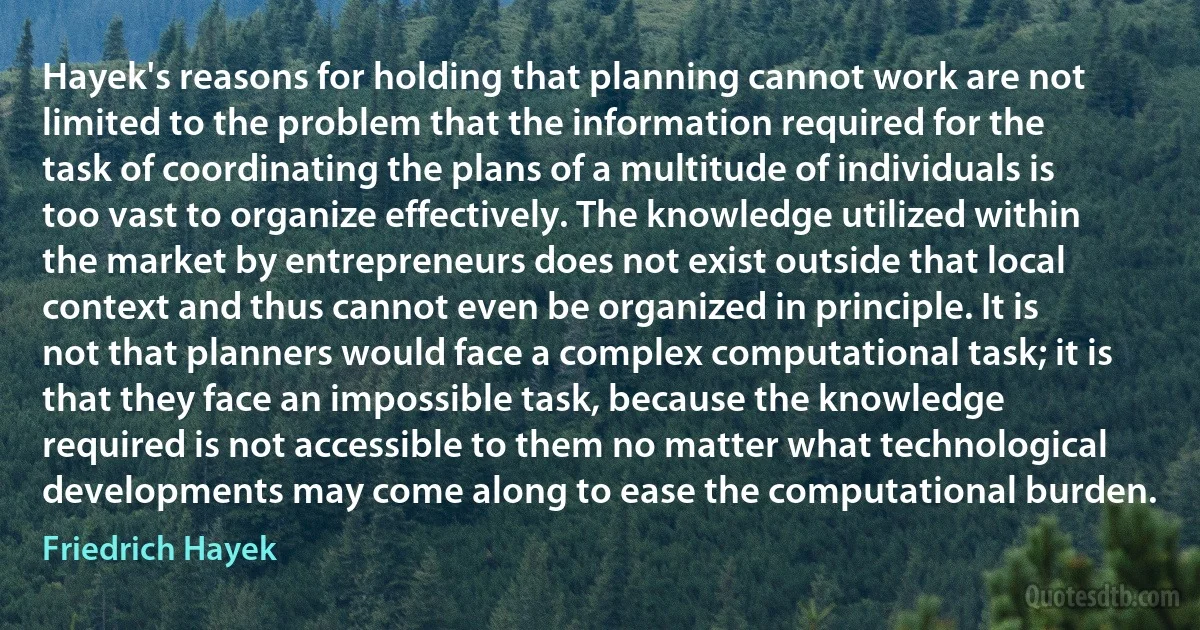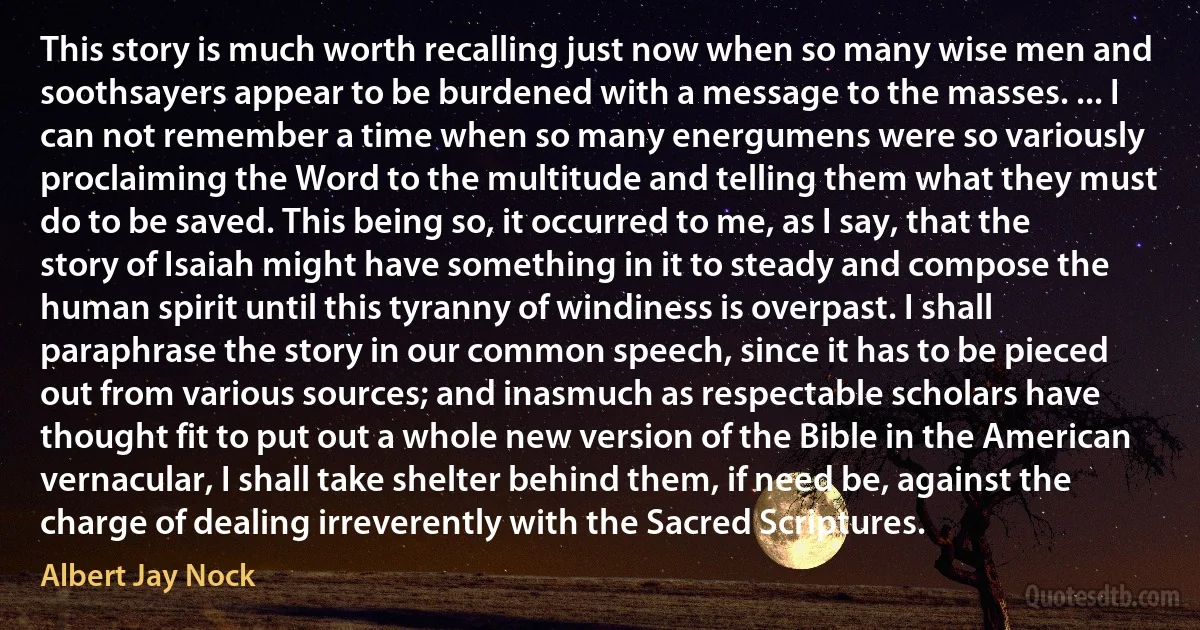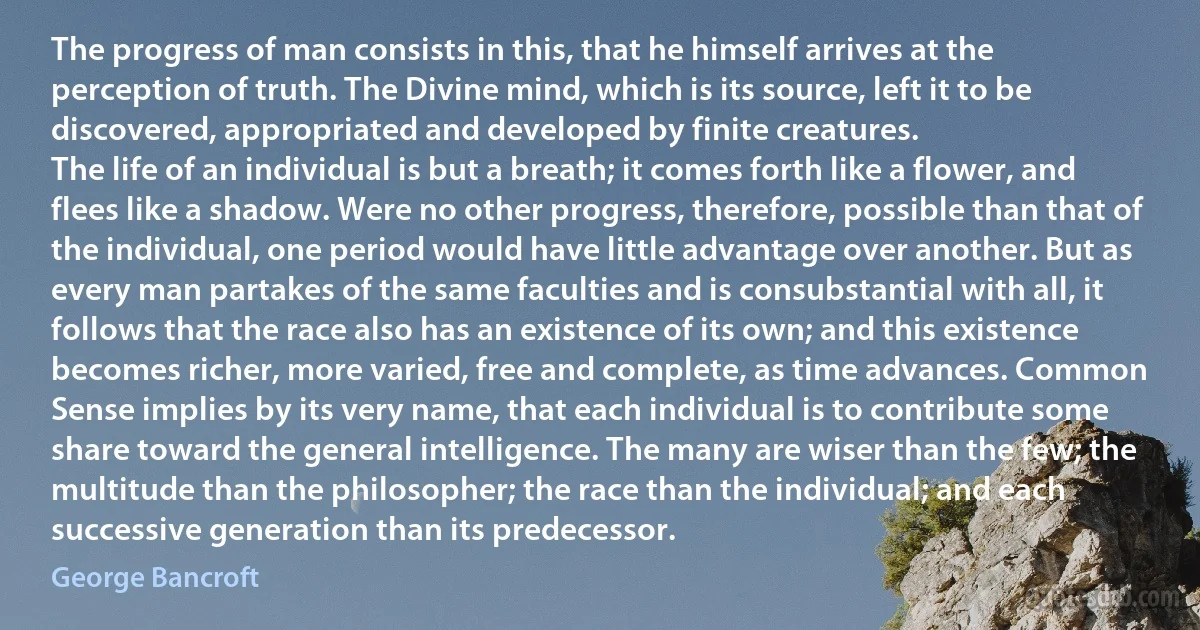Multitude Quotes - page 15
An experiment was in progress to ascertain if ordinary culture had attained a stage at which it would appreciate a flood of new thought relating to a science loftier than any dealing exclusively with phenomena perceptible to the physical senses, and in connection with that experiment I was privileged to receive a considerable volume of information relating to the early history of mankind millions of years antedating the range of historical record; also to the concatenation of worlds and the ultimate destinies of our own. Though crude and incomplete, this preliminary sketch of occult science and of the agency through which, though unknown to the multitude, the purpose of creation was being worked out on the physical plane, thrilled the readers of the message all over the civilized world to an extent which gave rise to an organization, the Theosophical Society, which now covers Great Britain, Europe generally, and the United States of America with innumerable branches.

Alfred Percy Sinnett
On electronic music: "The source is electronic, but what you do with it is the same as with acoustic instruments. Sound is sound and vibration is vibration, whether from an electronic source or an acoustic instrument. The way we use these sources is the key in order to define the required musical result. Without neglecting the acoustic conventional instruments, I spend a fair amount of time dealing with the electronic sources of sound. But please do not think computers! Computers are extremely helpful and amazing for a multitude of scientific areas, but for me, when it comes to creation, they are insufficient and slow. Therefore all of my efforts are to stay away from that beast".

Vangelis
Among the multitude of games which seem to constitute the real business of life in New Mexico, that of chuza evidently presents the most attractions to ladies; and they generally lay very heavy wagers upon the result. It is played with little balls, and bears some faint resemblance to what is called roulette. Bull-baiting and cock-fighting, about which so much has been said by every traveler in Mexico, are also very popular 'amusements' in the North, and generally lead to the same excesses and the same results as gaming. The cock-pit rarely fails to be crowded on Sundays and other feast days; on which occasions the church, the ball-room, the gambling-house, and the cock-pit look like so many opposition establishments; for nothing is more common than to see people going from one place to another by alternate fits, just as devotional feeling or love of pleasure happens to prompt them.

Josiah Gregg
As it now appeared that we had been forced at least two points north of the course we had originally intended to steer, by the northern bearing of the Canadian, we made an effort to cross a ridge of timber to the south, which, after considerable labor, proved successful. Here we found a multitude of gravelly, bright-flowing streams, with rich bottoms, lined all along with stately white oak, black-walnut, mulberry, and other similar growths, that yielded us excellent materials for wagon repairs, of which the route from Missouri, after passing Council Grove, is absolutely in want.

Josiah Gregg
...no legislator, at any period of the world, has willingly placed the seat of active power in the hands of the multitude: Because there it admits of no control, no regulation; no steady direction whatsoever. The people are the natural control on authority; but to exercise and to control together is contradictory and impossible.

Edmund Burke
Oh! what a frightful business is this modern society; the race for wealth - wealth. I am ashamed to write the word. Wealth means well-being, weal, the opposite of woe. And is that money? or can money buy it? We boast much of the purity of our faith, of the sins of idolatry among the Romanists, and we send missionaries to the poor unenlightened heathens, to bring them out of their darkness into our light, our glorious light; but oh! if you may measure the fearfulness of an idol by the blood which stains its sacrifice, by the multitude of its victims, where in all the world, in the fetish of the poor negro, in the hideous car of Indian Juggernaut, can you find a monster whose worship is polluted by such enormity as this English one of money!

James Anthony Froude
Not only are we unable to conceive of the full and living God as masculine simply, but we are unable to conceive of Him as individual simply, as the projection of a solitary I, an unsocial I, an I that is in reality an abstract I. My living I is an I that is really a We; my living personal I lives only in other, of other, and by other I's; I am sprung from a multitude of ancestors. I carry them within me in extract, and at the same time I carry within me, potentially, a multitude of descendants, and God, the projection of my I to the infinite - or rather I, the projection of God to the finite - must also be a multitude. Hence, in order to save the personality of God - that is to say, in order to save the living God - faith's need - the need of the feeling and the imagination - of conceiving Him and feeling Him as possessed of a certain internal multiplicity.

Miguel de Unamuno
In the beginning Man created God; and in the image of Man created he him.
2 And Man gave unto God a multitude of names, that he might be Lord over all the earth when it was suited to Man.
3 And on the seven millionth day Man rested and did lean heavily on his God and saw that it was good.
4 And Man formed Aqualung of the dust of the ground, and a host of others likened unto his kind.
5 And these lesser men Man did cast into the void. And some were burned; and some were put apart from their kind.
6 And Man became the God that he had created and with his miracles did rule over all the earth.
7 But as all these things did come to pass, the Spirit that did cause man to create his God lived on within all men: even within Aqualung.
8 And man saw it not.
9 But for Christ's sake he'd better start looking.

Ian Anderson (musician)
When there were gathered together an innumerable multitude of people, insomuch that they trode one upon another, he began to say unto his disciples first of all, Beware ye of the leaven of the Pharisees, which is hypocrisy. For there is nothing covered, that shall not be revealed; neither hid, that shall not be known. Therefore whatsoever ye have spoken in darkness shall be heard in the light; and that which ye have spoken in the ear in closets shall be proclaimed upon the housetops. And I say unto you my friends, Be not afraid of them that kill the body, and after that have no more that they can do. But I will forewarn you whom ye shall fear: Fear him, which after he hath killed hath power to cast into hell; yea, I say unto you, Fear him.

Jesus Christ
Homer was a poet, and knew that one touch of beauty redeems a multitude of sins; Hesiod [the poor poet] was a peasant who grudged the cost of a wife, and grumbled at the impudence of women who dared to sit at the same table with their husbands. Hesiod, with rough candor, shows us the ugly basement of early Greek society-the hard poverty of serfs and small farmers upon whose toil rested all the splendor and war sport of the aristocracy and the kings. Homer sang of heroes and princes for lords and ladies; Hesiod knew no princes, but sang his lays of common men, and pitched his tune accordingly. In his verses we hear the rumblings of those peasant revolts that would produce in Attica the reforms of Solon and the dictatorship of Peisistratus.

Will Durant
Speaking generally, he holds dominion, to whom are entrusted by common consent affairs of state - such as the laying down, interpretation, and abrogation of laws, the fortification of cities, deciding on war and peace, &c. But if this charge belong to a council, composed of the general multitude, then the dominion is called a democracy; if the council be composed of certain chosen persons, then it is an aristocracy ; and, if, lastly, the care of affairs of state, and, consequently, the dominion rest with one man, then it has the name of monarchy.

Baruch Spinoza
Jefferson instead recognizes that the multitude will act at times on the basis of ignorance, and yet he still affirms not only their right to rebel but also the benefits of their rebellion. His thinking in this regard runs parallel to that of Spinoza, and, in fact, Spinoza's thought can help carry this line of democratic thinking further. The two thinkers share a pair of basic assumptions: one on the virtue of disobedience, since freedom can never result from obedience to authority; and another on the capacities of the multitude, even though it is born ignorant, to become intelligent and rule itself autonomously. The process leading the multitude from ignorance to wisdom is indeed the steep path that runs throughout Spinoza's work.

Baruch Spinoza
Instead of engaging in this rather boring academic exercise of opposing Spinoza and Levinas, what I want to accomplish is a consciously old-fashioned Hegelian reading of Spinoza - what both Spinozeans and Levinasians share is radical anti-Hegelianism. My starting hypothesis is that, in the history of modern thought, the triad of paganism-Judaism-Christianity repeats itself twice, first as Spinoza-Kant-Hegel, then as Deleuze-Derrida-Lacan. Deleuze deploys the One-Substance as the indifferent medium of multitude; Derrida inverts it into the radical Otherness which differs from itself; finally, in a kind of "negation of negation," Lacan brings back the cut, the gap, into the One itself. The point is not so much to play Spinoza and Kant against each other, thus securing the triumph of Hegel; it is rather to present the three philosophical positions in all their unheard-of radicality - in a way, the triad Spinoza-Kant-Hegel does encompass the whole of philosophy.

Baruch Spinoza
Don't talk to me about your hideous reality! What does it mean - reality? Some see things black, others blue - the multitude sees them brute-fashion. There is nothing less natural than Michael Angelo; there is nothing more powerful! The anxiety about eternal truth is a mark of contemporary baseness; and art will become, if things go on in that way, a sort of poor joke as much below religion as it is below poetry, and as much below politics as it is below business. You will never reach its end - yes, its end! - which is to cause within us an impersonal exaltation, with petty works, in spite of all your finished execution.

Gustave Flaubert
To fathers within their private families Nature hath given a supreme power; for which cause we see throughout the world even from the foundation thereof, all men have ever been taken as lords and lawful kings in their own houses. Howbeit over a whole grand multitude having no such dependency upon any one, and consisting of so many families as every politic society in the world doth, impossible it is that any should have complete lawful power, but by consent of men, or immediate appointment of God; because not having the natural superiority of fathers, their power must needs be either usurped, and then unlawful; or, if lawful, then either granted or consented unto by them over whom they exercise the same, or else given extraordinarily from God, unto whom all the world is subject.

Richard Hooker
We hold; that seeing there is not any man of the Church of England but the same man is also a member of the commonwealth; nor any man a member of the commonwealth, which is not also of the Church of England; therefore as in a figure triangular the base doth differ from the sides thereof, and yet one and the selfsame line is both a base and also a side; a side simply, a base if it chance to be the bottom and underlie the rest: so, albeit properties and actions of one kind do cause the name of a commonwealth, qualities and functions of another sort the name of a Church to be given unto a multitude, yet one and the selfsame multitude may in such sort be both, and is so with us, that no person appertaining to the one can be denied to be also of the other.

Richard Hooker
What good would a proclamation of emancipation from me do, especially as we are now situated? I do not want to issue a document that the whole world will see must necessarily be inoperative, like the Pope's bull against the comet! Would my word free the slaves, when I cannot even enforce the Constitution in the rebel States? Is there a single court, or magistrate, or individual that would be influenced by it there! And what reason is there to think it would have any greater effect upon the slaves than the late law of Congress, which I approved, and which offers protection and freedom to the slaves of rebel masters who come within our lines? Yet I cannot learn that that law has caused a single slave to come over to us. And suppose they could be induced by a proclamation of freedom from me to throw themselves upon us, what should we do with them? How can we feed and care for such a multitude?

Abraham Lincoln
Thou wert as a lone star, whose light did shine
On some frail bark in winter's midnight roar:
Thou hast like to a rock-built refuge stood
Above the blind and battling multitude:
In honoured poverty thy voice did weave
Songs consecrate to truth and liberty,-
Deserting these, thou leavest me to grieve,
Thus having been, that thou shouldst cease to be.

Percy Bysshe Shelley



